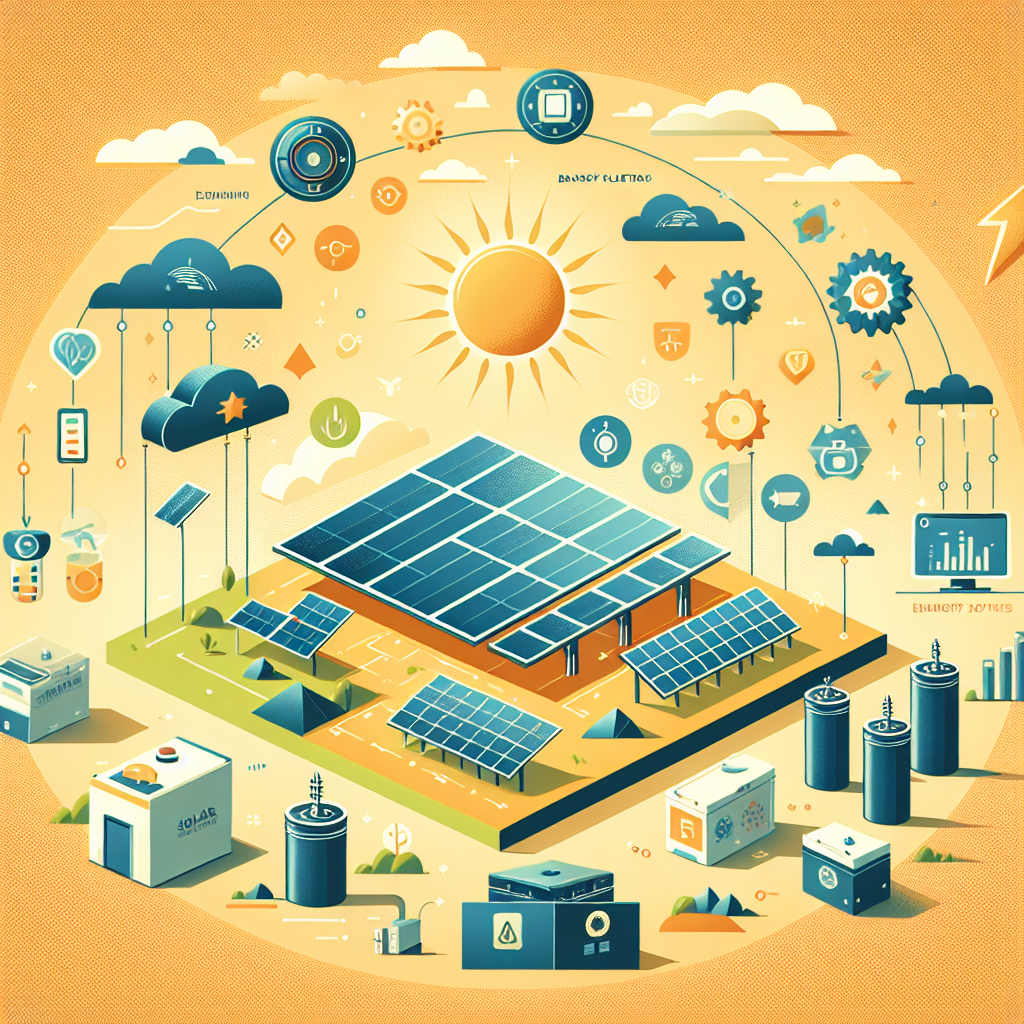Imagine a world where the sun provides an endless source of power for all your energy needs. Solar power is gaining popularity as an environmentally friendly and sustainable energy solution. But what happens when the sun goes down or is hidden behind clouds? In this article, we will explore the importance of backup solutions when relying on solar power. Discover the key backup options that will ensure uninterrupted power supply, giving you peace of mind and a reliable energy source even during cloudy days.

Solar Power Backup Solutions
When relying on solar power as your primary source of energy, it’s important to have backup solutions in place to ensure uninterrupted power supply, especially during periods of low sunlight or unexpected power outages. In this article, we will explore various backup options that you can consider to enhance the reliability and efficiency of your solar power system.
Battery Storage Systems
Battery storage systems can be a highly effective backup solution for your solar power setup. These systems store excess energy generated by your solar panels during the day and allow you to utilize it when the sun is not shining or during power outages. There are different types of batteries you can choose from, such as lead-acid batteries, lithium-ion batteries, and saltwater batteries. Each type has its own advantages and considerations, so it’s important to understand the differences before making a decision.
When it comes to sizing and capacity, it’s crucial to determine your energy needs and usage patterns. Calculating the appropriate battery size will ensure that you have enough stored energy to meet your requirements during low sunlight periods or when the grid is down. Additionally, proper installation of battery storage systems is vital to ensure their optimal performance and safety. It’s recommended to consult with a professional installer who can guide you through the process and ensure the system is installed correctly.
Generator Backup
Another reliable backup option for your solar power system is a generator backup. Generators can provide continuous power supply when your solar panels are not generating enough electricity to meet your needs. There are different types of generators available, including portable generators, standby generators, and hybrid generators. Each type has its own advantages and considerations, such as fuel type, noise level, and power output.
Similar to battery storage systems, determining the appropriate sizing and capacity of the generator is crucial. Understanding your energy needs and the power requirements of your home or business will help you select the right generator that can deliver sufficient backup power. Additionally, automation features can greatly enhance the convenience of generator backup systems. Automatic transfer switches can automatically switch between solar power and generator power during outages, providing seamless backup without manual intervention.
Grid Connection as Backup
Grid connection can serve as an effective backup option for your solar power system. Net metering allows you to feed excess solar energy back into the grid, earning credits that you can use when your solar panels are not generating enough electricity. This creates a virtual backup system where the grid acts as a reservoir of power during times of low sunlight or power outages. However, it’s important to check with your utility company to ensure they offer net metering and understand the specific regulations and requirements involved.
For enhanced backup capabilities, you can consider a grid-tied system with battery backup. This setup allows you to store excess solar energy in batteries for later use, while still being connected to the grid. During power outages or when solar production is insufficient, the batteries can provide backup power, ensuring uninterrupted electricity supply to your home or business. It’s important to properly size and install the battery storage system in accordance with your energy needs and the requirements of the grid-tied system.
Solar Power Inverters
Selecting the right inverter is crucial for the optimal performance and backup capabilities of your solar power system. Inverters convert the direct current (DC) produced by your solar panels into alternating current (AC) that can be used to power your home or business. Off-grid inverters are designed for standalone systems with no grid connection, making them suitable for remote locations or off-grid setups. Grid-tied inverters are designed to work in parallel with the grid and allow you to feed excess solar energy back into the grid.
For backup purposes, grid-tied inverters with backup functionality can be an ideal choice. These inverters have built-in features that allow them to disconnect from the grid during outages and operate in island mode, providing backup power from your solar panels and battery storage system. This ensures that you have a reliable backup solution that seamlessly transitions between grid power and solar power during outages or low sunlight periods.
Solar Power Optimizers
Solar power optimizers are devices that enhance the performance and reliability of your solar power system. They optimize the power output of individual solar panels, ensuring maximum energy production even in shaded or unevenly lit areas. Solar power optimizers also provide monitoring capabilities, allowing you to track the performance of each individual panel and identify any potential issues or inefficiencies.
One of the main benefits of using solar power optimizers is their compatibility with grid-tied systems. By optimizing the power output of each panel, these devices can significantly improve the overall performance and efficiency of your solar power system. This can be especially beneficial during periods of low sunlight or shading, as it ensures that your system continues to generate as much electricity as possible.
Maintenance and Monitoring
To ensure the reliability and longevity of your backup solutions, regular inspections and maintenance are essential. Routine inspections can help identify any issues or faults in your solar power system, allowing you to address them promptly and prevent any potential disruptions in backup power supply. It’s recommended to hire a professional solar installer or technician to conduct these inspections to ensure proper assessment and maintenance.
Remote monitoring can also play a vital role in maintaining the effectiveness of your backup solutions. By utilizing monitoring systems and software, you can remotely monitor the performance and status of your solar panels, batteries, generators, and inverters. This allows you to proactively identify any issues and take appropriate actions, ensuring that your backup systems are always ready to provide reliable power supply.
Additionally, there are some maintenance tips you can follow to keep your backup solutions in optimal condition. Regularly cleaning your solar panels to remove dirt and debris can improve their efficiency and energy production. Checking the battery terminals for corrosion or loose connections and ensuring proper ventilation for generators are also important maintenance practices. Following manufacturer guidelines and recommendations for maintenance and operation will ensure the longevity and performance of your backup solutions.
Backup Solutions for Different Needs
The backup solutions discussed in this article are applicable to various types of solar power systems. Whether you have a residential solar system, a commercial solar system, or an off-grid system, there are backup options available to enhance the reliability and efficiency of your solar power setup. However, the specific requirements and considerations may vary depending on the scale and complexity of the system. Consulting with a solar professional can help you determine the most suitable backup solutions for your specific needs and circumstances.
Considerations for DIY Projects
If you are considering a DIY solar power project, it’s important to be aware of the knowledge and experience required to successfully install and maintain a backup system. Working with electricity and sophisticated equipment can be dangerous if not done correctly. It’s crucial to educate yourself about the installation process, safety guidelines, and the permits and regulations involved in your area. If you are uncertain or inexperienced, it’s highly recommended to seek professional assistance to ensure the safety and effectiveness of your backup solutions.
Conclusion
When relying on solar power, having backup solutions in place is essential for uninterrupted power supply and peace of mind. Battery storage systems, generator backups, grid connection, solar power inverters, and solar power optimizers are all viable options to enhance the reliability and efficiency of your solar power system. Careful consideration of your energy needs, system requirements, and regulations will help you select the most suitable backup solutions for your specific circumstances. Regular maintenance and monitoring, as well as adherence to safety guidelines, will ensure the long-term effectiveness and performance of your backup systems. With the right backup solutions in place, you can confidently rely on solar power as a sustainable and dependable energy source.
